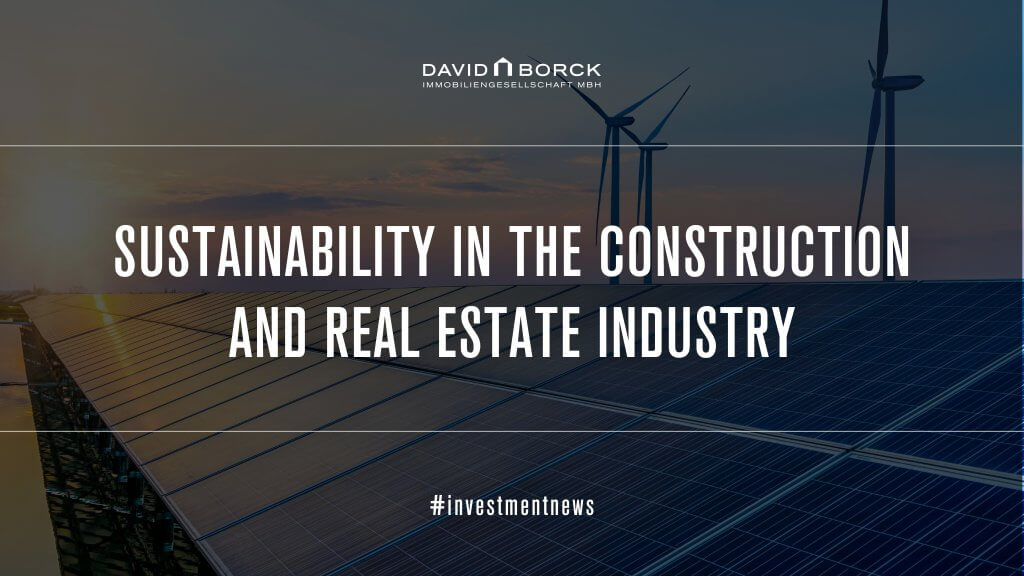
29.07.2021
Investment
Sustainability in the construction and real estate industry
Building, renovating, refurbishing – the real estate industry is one of the most resource-intensive economic sectors in the world and is responsible for a significant proportion of greenhouse gas emissions. As awareness of climate change continues to grow, so does the push for sustainable construction, and politicians are also urging action. In Germany, for example, the government plans for the entire building stock in the country to be nearly climate-neutral by 2050. That’s why the industry is doing a lot to minimize the consumption of energy and resources not only during the construction and operation of real estate, but also to take important factors into account as early as the planning phase.
Saving energy in real estate construction
Building materials such as reinforced concrete, steel and masonry are still dominant on construction sites. These require a great deal of energy in their production and in some cases release large amounts of CO2. Environmentally friendly alternatives, on the other hand, include concepts such as the cradle-to-cradle principle, which keeps building materials continuously in construction cycles and thus conserves resources. The goal is to increasingly use natural building materials such as wood, clay or straw, which can be returned to the natural cycle or reused after use. Demand for the renewable raw material wood in particular has skyrocketed as the construction industry transforms and prices have shot up.
The topic of digitalization is also playing an increasingly important role in the construction and later also in the use of real estate. For example, with the help of software solutions, complete buildings can be planned digitally in order to improve workflows. Budget- and resource-intensive errors and defects are detected at an early stage thanks to precise planning, before the actual construction process begins and rework on site is reduced to a minimum. This optimizes resource consumption, both in terms of costs and environmental impact, even before the actual construction begins.
Climate-neutral living in a zero-energy or plus-energy building
They are already at home on many rooftops: solar cells for generating electricity. Last year alone, 25% more solar roofs were installed in Germany than in 2019, and solar power production grew by 12%, more than any other form of energy. Specifically, photovoltaic systems in Germany generated about 50.4 billion kilowatts of electricity last year. The German government wants to double solar power plant capacity by the end of the decade. With the electricity generated in this way, buildings can mostly supply themselves. Or the electricity can be fed into the public grid and, thanks to the fixed feed-in tariff, provide a boost to household coffers.
Energy-autonomous buildings or zero-energy houses go one step further: Thanks to solar collectors and heat storage, these can be completely self-sufficient and at the same time minimize energy consumption through sustainable building management: Smart, intelligent technologies control lighting, thermostats and electrical appliances in the house, adapt to the usage patterns of the occupants and thus ensure efficient use of energy and resources. So-called plus-energy houses even produce more energy than they consume, for example providing extra energy for in-house charging station for electric cars.
Climate-friendly refurbishment of existing buildings
Owners and occupants of older buildings and apartments should consider energy-efficient renovation to improve their own carbon footprints. Single-family and multi-family homes built in the 1970s or earlier are real energy guzzlers. Such older buildings lose a large proportion (up to 50%) of their energy through facades, windows and doors. To counteract this, facades should be equipped with modern insulation and better insulated windows and doors. In addition, the basement and roof trusses can also be checked to see if they should be replaced. Although these renovation measures are costly, they pay for themselves after just a few years.
Your
David Borck Immobiliengesellschaft
Schlüterstraße 45 | 10707 Berlin | service@david-borck.de
Telefon +49 (0)30 887 742 50 | Telefax +49 (0)30 887 742 525

 Back
Back 




